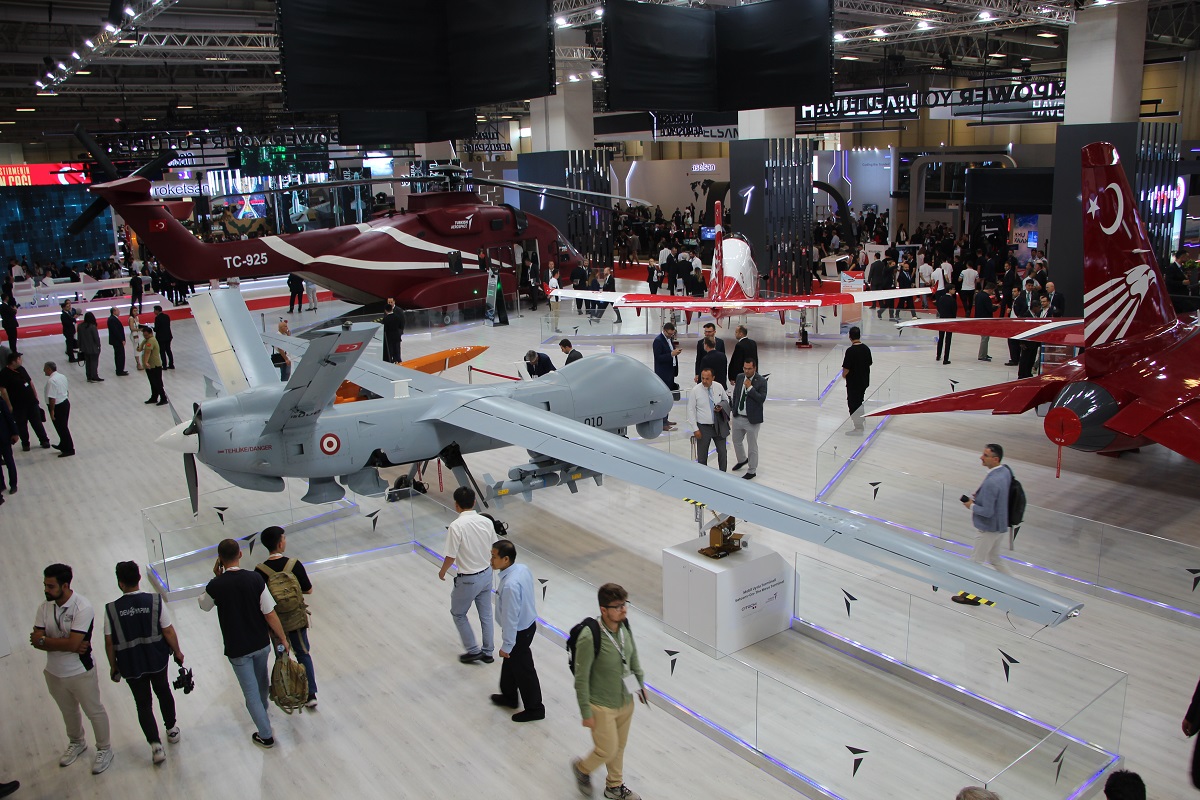The Best of Turkish Defence for the World’s Armed Forces at IDEF
ISTANBUL: Turkish defence companies showcased new and updated defence systems encompassing all battle domains for land, naval and air forces at a defence exhibition which ended over the weekend here. Some of the equipment, including unmanned systems, at IDEF 2023, better known as International Defence Industry Fair, were displayed for the first time.
In his speech opening the exhibition, President Recep Tayyip Erdogan said: “Turkiye is capable of producing various defence equipment, such as armoured vehicles, cannons, rockets, air defence systems, including radar systems that have been tested in conflict areas. This achievement has allowed us to meet almost all the land, sea and air warfare requirements for national defence.” He went on to say that “(Turkiye) is one of the top three countries in the world in unmanned and armed aircraft technology. Turkey is also one of the ten countries that build its own warships.”
Turkiye has become an important player in exporting defence equipment to several countries. This is shown in the achievement of defence industry export products in 2022, which reached 4.4 billion US dollars. In the first six months of 2023, the president said, the export value has reached 2.3 billion US dollars, from a target of 6 billion US dollars for this year.
“We do not only sell products, but also develop long-term partnerships and develop joint projects. We are happy to provide our knowledge and experience in the defence industry for the benefit of our friends,” he said.
IDEF, a biennial event that began in 1993, is hosted by Turkiye’s Ministry of National Defence and is held at the Tuyap Fair and Congress Centre. It is the fourth largest in the world, according to the fair’s website. The 16th iteration of the event saw the participation of around 1,500 local and international companies in Istanbul
Land Systems Break Cover
The KAPLAN HYBRID Vehicle was exhibited for the first time by FNSS. The Turkish armoured vehicle specialist made a significant breakthrough in areas such as the indigenous design and development of new generation drive systems, suspension systems, gearboxes and powertrains in line with the development and adaptation of new generation technologies for armoured combat vehicles.
The company said the HYBRID Power Pack offers remarkable off-road performance for a tracked vehicle with its external transmittable power and increased fuel economy. With the electric engine that produce high torque at low revs and the new hybrid propulsion system, the vehicle has an increased acceleration response than other tracked platforms. In this way, it is aimed to provide a critical advantage on the field in order to respond quickly to the battlefield conditions.
Developed for tracked vehicles weighing up to 20 tons, FNSS engineers said this solution can be adapted to new tracked vehicle development programs and capability enhancement and life extension programmes according to user needs. It is aimed to be resized and used for tracked vehicles of different tonnages in the very near future.
Unmanned Heavy Armoured Vehicle Updated
With the utilisation of Unmanned Ground Vehicles (UGVs) becoming increasingly common in the modern battlefield, FNSS presented the latest iteration of the SHADOW RIDER — an optionally manned combat system with remote control or autonomous capability.
FNSS said that SHADOW RIDER has been successfully used in an international military live exercise at the real-life operational scenario as a wingman. Many improvements have been implemented as a result of these field tests and exercises. With its design that allows the integration of useful payloads suitable for the mission, SHADOW RIDER concept has evolved into a family of autonomous unmanned ground vehicles that will serve in all kinds of missions, especially fire support.
FNSS’ concept is presented as a viable and adaptable solution that provides autonomous capability to a conventional land platform with a kit that can be integrated into any armoured ground vehicle.
“The military vehicle maker aims to create superiority in the field thanks to the new hybrid (diesel-electric) tracked vehicle propulsion system it has developed, with the features of silent drive, extended silent tracking and the ability to integrate new generation weapon systems with high energy needs. All these developments enable the vehicle to be used in combat and reconnaissance scenarios,” the company said.
The “SHADOW RIDER” Heavy Class Unmanned Ground vehicle (H-UGV) is currently based on the M113 type vehicle platform, variants of which are used by many armed forces worldwide including the Asia-Pacific.
ASELSAN Largest Exhibitor
It was not a surprise that military electronics specialist ASELSAN was the biggest exhibitor at the show. Turkiye’s largest defence company unveiled four manned, multi-purpose armoured vehicles. Aselsan CEO Haluk Gorgun launched the wheeled Gokberk mobile laser weapon system, Gokdemir missile launching system, and Goksun and Gurz air and missile defence systems.
Gokberk’s mobile laser system is augmented by other counter-drone tech and is billed as able to counter mini- and micro-UAVs with soft kill and hard kill capabilities. Gokdemir has a rotating turret for missile-based air defence capability, and is capable of multiple engagement and successive firing abilities with data link for mid-course guidance, according to the company.
The Gurz mobile tactical air defence system based on an 8X8 vehicle, as a proposed platform to protect fixed units as well as military formations on the move. Designed to target very-low or low-altitude targets like artillery munition or missiles as well as drones, helicopters and low-flying fixed-wing aircraft. Analysts have compared the system to the Russian Pantsir Gun-Missile air defence systems.
Software systems company Havelsan, displayed Barkan II, the advanced version of the Barkan unmanned ground system used by the Turkish military. Havelsan said it has been testing the robot over the past year and a half, incorporating a 12.7mm weapon and features enhanced mobility. It doubles the vehicle’s weight capacity and is equipped to carry heavy weapons. The company plans to upgrade the system with grenade launchers and other missile variants.
Roketsan, the major Turkish missile producer debuted its first naval missile defence system. The Levent system can carry up to 11 missiles and is mounted with four radars. Levent missiles are 128mm and have a range of 11 km, with passive radio frequency guidance.
STM’s Multi Domain Integration Expertise
Türkiye’s first national frigate, TCG İSTANBUL (F-515), which was designed and built under the main contractorship of STM and recently started its sea trials, was anchored in Büyükçekmece, close to the IDEF event venue attracting expert visitors.
At the show, STM exhibited its MILGEM İ-Class frigate and its STM 500 – Türkiye’s first small-sized national submarine, the construction of which was launched last year.
Türkiye’s first national corvette, the Ada-Class MILGEM, the Pakıstan Navy Fleet Tanker, the STM-MPAC Multi Purpose Attack Craft, offering high speed-manoeuvrability and capable of firing surface-to-surface guided missiles, and STM’s coastguard ships was also highlighted at IDEF.
It was reported that STM has plans to develop an autonomous unmanned submarine. The company has expertise in unmanned aerial systems with swarming capabilities, and plans to apply this knowledge to the underwater vehicle market. The company plans to provide full autonomy in this submarine, with an option of swarming capabilities for the underwater vehicle in the future.
“STM have been dealing with submarines for quite a long time, we are building submarines, we are modernising submarines, and in parallel we are the first and the biggest Turkish loitering munition producing firm,” STM general manager Ozgur Guleryuzwho was quoted as saying at the show. The development phase of this autonomous underwater vehicle is to be finalised by the second half of 2024. It will be based on the company’s STM 500 manned mini submarine but smaller.
In the halls were STM’s tactical mini-UAV systems. KARGU, Türkiye’s first national attack UAV that has been exported to nearly 10 countries on three different continents to date; Mini UAV BOYGA with Mortar Payload, which was added to the Turkish Armed Forces (TAF) inventory last year; and TOGAN, a national surveillance and reconnaissance UAV, were also be on display at the STM stand. Visitors to the STM stand viewed the Smart Loitering Munition System ALPAGUT and fixed-wing Loitering Munition System ALPAGU.
STM’s “Through-the-Wall Radar “ system, which was used to locate more than 50 survivors of the 6 February earthquakes in Kahramanmaraş who were subsequently pulled from the rubble, was also displayed at the fair.
Turkish Aerospace Flying High
Turkish Aerospace Industries (TAI) or Turkish Aerospace made a strong showing at IDEF with its range of airframes. They include the ANKA MALE drone, Hurjet advanced jet trainer and KAAN — Turkiye’s fifth generation fighter aircraft. For the first time, Turkish Aerospace presented its T-925 multi-role utility helicopter. Also on display is a mockup of the Future Multirole Heavy Combat Helicopter under a programme launched under the auspices of the Presidency of Defence Industries (SSB).
Expected to make its maiden flight next year, the T-925 has a large cabin area and a ramp door that can be configured for military and civilian use. Turkish Aerospace chief executive officer Temel Kotil said: “It completes our range. This (T-925) is the final piece of the puzzle. It is the big sister of Gökbey. It can carry 20 people and has a weight capacity of 10 tonnes. It has a ramp at the back and can accommodate a Jeep inside.”
The state owned company has recently inked several agreements and contracts including with Malaysia’s G7 Aerospace as part of an industrial collaboration programme as part of the supply of ANKA drones for Malaysia.
It has also signed an agreement with Azerbaijan’s Ministry of Defence Industry for cooperation in the KAAN fighter project covering the training of engineers within the framework of the production of fighters.
It was also reported that Turkish Aerospace has an agreement with Indonesia for twelve ANKA drones – six to be made in Turkiye and the rest to made locally in cooperation with aircraft maker by PT Dirgantara Indonesia (PTDI).
Ankara-based Turkish Aerospace provides services in the design, development, modernisation, production, integration and lifecycle support for aeronautics and space systems.
Other Deals Signed
Several deals in the defence and aerospace sectors were signed at the 16th International Defense Industry Fair (IDEF).
The four-day event, which closed on Friday (July 28), saw the participation of around 1,500 domestic and foreign companies in Istanbul.
Türkiye’s Defense Industry Agency (SSB) has signed an agreement for radar systems and the production and integration process of some missiles.
TAI Engine Industries (TEI) and Petroleum Pipeline Corporation (Botas) signed a deal for maintenance and support of turbine and natural gas compressor systems.
Türkiye’s missile producer Roketsan signed five agreements with Turkish defense firms Havelsan, Asisguard, Kraken, Aselsan and Asfat.
Another Turkish defence firm, Lentatek signed an agreement with R&D Centre Kazakhstan for cooperating in future technologies, particularly hydrogen, battery, and unmanned aviation systems.
Turkish National Defence Minister Yasar Guler and his Tajik counterpart Gen Sherali Mirzo signed a military and financial cooperation agreement, and a protocol on financial aid between the two countries.
SSB has signed another deal with Turkish Aerospace Industries (TAI) for modernising the country’s F-16 Block-30 and Block-40/50 type aircraft by 2025.
Teknopark Istanbul signed agreements with five different firms, which are BMC, Alstom, STM, Sanlab and Key4, for entrepreneurship.
The UAE’s Black Cobra Military Supply (BCMS) and Türkiye’s Ostim Defense and Aviation Cluster (OSSA) signed an agreement for business relations and technology transfer.
A Turkish gun-maker, Sarsilmaz, signed an agreement for armed drones with Asisguard.
Turkish defense companies TAIS OG, STM and Isbir signed deals for supplying and qualification of the country’s new MILGEM Istif class ships’ diesel generator sets.
TAI and a Turkish defence firm Havelsan signed a contract for training systems of the country’s new advanced fighter jet, KAAN. –adj/mhi/mgm (Pix: ADJ/companies)


